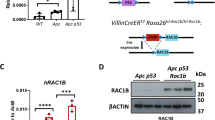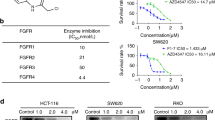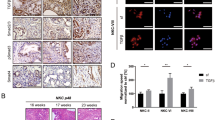Abstract
As colorectal cancer remains the second highest cause of cancer-related deaths in much of the industrialised world, identifying novel strategies to prevent colorectal tumour development remains an important challenge. BAG-1 is a multi-functional protein, the expression of which is up-regulated at relatively early stages in colorectal tumorigenesis. Importantly, BAG-1 is thought to enhance colorectal tumour progression through promoting tumour cell survival. Here, we report for the first time a novel role for BAG-1, establishing it as a suppressor of transforming growth factor β (TGF-β1) expression in colorectal tumour cells. Microarray analysis first highlighted the possibility that BAG-1 may regulate TGF-β1 expression, a key cytokine in normal colonic tissue homoeostasis. Q-RT–PCR and ELISA demonstrated TGFB1 mRNA and protein expression to be significantly increased when BAG1 levels were reduced by small interfering RNA; additionally, induction of BAG-1L caused suppression of TGFB1 mRNA in colorectal tumour cells. Using reporter and chromatin immunoprecipitation assays, a direct association of BAG-1 with the TGFB1 gene regulatory region was identified. Immunohistochemistry and Weiser fraction data indicated that the levels of BAG-1 and TGF-β1 are inversely correlated in the normal colonic epithelium in vivo, consistent with a role for BAG-1-mediated repression of TGF-β1 production. In vitro studies showed that the change in TGF-β1 production following manipulation of BAG-1 is functionally relevant; through induction of anchorage-independent growth in TGF-β1-dependent normal rat kidney fibroblasts and regulation of SMAD2 phosphorylation in TGF-β1-sensitive adenoma cells. Taken together, this study identifies the anti-apoptotic protein BAG-1 as a suppressor of the inhibitory growth factor TGF-β1, suggesting that high expression of BAG-1 can impact on a number of the hallmarks of cancer, of potential importance in promoting the early stages of colorectal tumorigenesis. Establishing BAG-1 as a repressor of TGF-β1 has important biological implications, and highlights a new role for BAG-1 in colorectal tumorigenesis.
This is a preview of subscription content, access via your institution
Access options
Subscribe to this journal
Receive 50 print issues and online access
$259.00 per year
only $5.18 per issue
Buy this article
- Purchase on Springer Link
- Instant access to full article PDF
Prices may be subject to local taxes which are calculated during checkout





Similar content being viewed by others
References
Massagué J . TGFbeta in cancer. Cell 2008; 134: 215–230.
Ikushima H, Miyazono K . TGF-beta signalling: a complex web in cancer progression. Nat Rev Cancer 2010; 10: 415–424.
Moustakas A, Heldin CH . The regulation of TGFbeta signal transduction. Development 2009; 136: 3699–3714.
Avery A, Paraskeva C, Hall P, Flanders KC, Sport M, Moorghen M . TGF-beta expression in the human colon: differential immunostaining along the crypt epithelium. Br J Cancer 1993; 68: 137–139.
Barnard JA, Warwick GJ, Gold LI . Localization of transforming growth factor beta isoforms in the normal murine small intestine and colon. Gastroenterology 1993; 105: 67–73.
Heldin CH, Landström M, Moustakas A . Mechanism of TGF-beta signalling to growth arrest, apoptosis and epithelial-mesenchymal transition. Curr Opin Cell Biol 2009; 21: 166–176.
Lampropoulos P, Zizi-Sermpetzoglou A, Rizos S, Kostakis A, Nikiteas N, Papavassiliou AG . TGF-beta signalling in colon carcinogenesis. Cancer Lett 2012; 314: 1–7.
Babyatsky MW, Rossiter G, Podolsky DK . Expression of transforming growth factors alpha and beta in colonic mucosa in inflammatory bowel disease. Gastroenterology 1996; 110: 798–802.
Townsend PA, Stephanou A, Packham G, Latchman DS . BAG-1: a multi-functional pro-survival protein. Int J Biochem Cell Biol 2005; 37: 251–259.
Packham G, Brimmell M, Cleveland JL . Mammalian cells express two differently localized Bag-1 isoforms generated by alternative translation initiation. Biochem J 1997; 328: 807–813.
Sharp A, Crabb SJ, Townsend PA, Cutress RI, Brimmell M, Wang XH et al. BAG-1 in carcinogenesis. Exp Rev Mol Med 2004; 6: 1–15.
Clemo NK, Collard TJ, Southern SL, Edwards KD, Moorghen M, Packham G et al. BAG-1 is up-regulated in colorectal tumour progression and promotes colorectal tumour cell survival through increased NF-kappaB activity. Carcinogenesis 2008; 29: 849–857.
Arhel NJ, Packham G, Townsend PA, Collard TF, H-Zadeh AM, Sharp A et al. The retinoblastoma protein interacts with Bag-1 in human colonic adenoma and carcinoma derived cell lines. Int J Cancer 2003; 106: 364–371.
Barnes JD, Arhel NJ, Lee SS, Sharp A, Al-Okail M, Packham G et al. Nuclear BAG-1 expression inhibits apoptosis in colorectal adenoma-derived epithelial cells. Apoptosis 2005; 10: 301–311.
Kikuchi R, Noguchi T, Takeno S, Funada Y, Moriyama H, Uchida Y . Nuclear BAG-1 expression reflects malignant potential in colorectal carcinomas. Br J Cancer 2002; 87: 1136–1139.
Gehring U . Multiple, but concerted cellular activities of the human protein Hap46/BAG-1M and isoforms. Int J Mol Sci 2009; 10: 906–928.
Niyaz Y, Zeiner M, Gehring U . Transcriptional activation by human Hsp70-associating protein Hap50. J Cell Sci 2001; 114: 1839–1845.
Zeiner M, Niyaz Y, Gehring U . The hsp70-associating protein Hap46 binds to DNA and stimulates transcription. Proc Natl Acad Sci USA 1999; 96: 10194–10199.
Cutress RI, Townsend PA, Sharp A, Maison A, Wood L, Lee R et al. The nuclear BAG-1 isoform, BAG-1L, enhances oestrogen-dependent transcription. Oncogene 2003; 22: 4973–4982.
Shatkina L, Mink S, Rogatsch H, Klocker H, Langer G, Nestl A et al. The cochaperone Bag-1L enhances androgen receptor action via interaction with the NH2-terminal region of the receptor. Mol Cell Biol 2003; 23: 7189–7197.
Wang XH, O’Connor D, Brimmell M, Packham G . The BAG-1 co-chaperone is a negative regulator of p73-dependent transcription. Br J Cancer 2009; 100: 1347–1357.
Southern SL, Collard TJ, Urban BC, Skeen VR, Smartt HJ, Hague A et al. BAG-1 interacts with the p50-p50 homodimeric NF-kappaB complex: implications for colorectal carcinogenesis. Oncogene 2012; 31: 2761–2772.
Takayama S, Krajewski S, Krajewska M, Kitada S, Zapata JM, Kochel K et al. Expression and location of Hsp70/Hsc-binding anti-apoptotic protein BAG-1 and its variants in normal tissues and tumour cell lines. Cancer Res 1998; 58: 3116–3131.
Kim SJ, Glick A, Sporn MB, Roberts AB . Characterization of the promoter region of the human transforming growth factor-beta 1 gene. J Biol Chem 1989; 264: 402–408.
Barnard JA, Warwick GJ . Butyrate rapidly induces growth inhibition and differentiation in HT-29 cells. Cell Growth Diff 1993; 4: 495–501.
Wang G, Higgins PJ, Gannon M, Staiano-Coico L . Transforming growth factor-beta 1 acts cooperatively with sodium n-butyrate to induce differentiation of normal human keratinocytes. Exp Cell Res 1992; 198: 27–30.
Hague A, Singh B, Paraskeva C . Butyrate acts as a survival factor for colonic epithelial cells: further fuel for the in vivo versus in vitro debate. Gastroenterology 1997; 112: 1036–1040.
Mariadason JM, Nicholas C, L’Italien KE, Zhuang M, Smartt HJ, Heerdt BG et al. Gene expression profiling of intestinal epithelial cell maturation along the crypt-villus axis. Gastroenterology 2005; 128: 1081–1088.
Smartt HJ, Greenhough A, Ordóñez-Morán P, Talero E, Cherry CA, Wallam CA et al. Beta-catenin represses expression of the tumour suppressor 15-prostaglandin dehydrogenase in the normal intestinal epithelium and colorectal tumour cells. Gut 2012; 61: 1306–1314.
Manning AM, Williams AC, Game SM, Paraskeva C . Differential sensitivity of human colonic adenoma and carcinoma cells to transforming growth factor beta (TGF-beta): conversion of an adenoma cell line to a tumorigenic phenotype is accompanied by a reduced response to the inhibitory effects of TGF-beta. Oncogene 1991; 6: 1471–1476.
Skeen VR, Paterson I, Paraskeva C, Williams AC . TGF-β1 signalling, connecting aberrant inflammation and colorectal tumori-genesis. Curr Pharm Des 2012; 18: 3874–3888.
Datto MB, Li Y, Panus JF, Howe DJ, Xiong Y, Wang XF . Transforming growth factor-beta induces the cyclin-dependent kinase inhibitor p21 through a p53-independent mechanism. Proc Natl Acad Sci USA 1995; 92: 5545–5549.
Polyak K, Kato JY, Solomon MJ, Sherr CJ, Massagué J, Roberts JM et al. p27Kip1, a cyclin-Cdk inhibitor, links transforming growth factor-beta and contact inhibition to cell cycle arrest. Genes Dev 1994; 8: 9–22.
Pardali K, Kurisaki A, Morén A, ten Dijke P, Kardassis D, Moustakas A . Role of Smad proteins and transcription factor Sp1 in p21(Waf1/Cip1) regulation by transforming growth factor-beta. J Biol Chem 2000; 275: 29244–29256.
Mulder KM, Levine AE, Hernandez X, McKnight MK, Brattain DE, Brattain MG . Modulation of c-myc by transforming growth factor-beta in human colon carcinoma cells. Biochem Biophys Res Commun 1988; 150: 711–716.
Zhang XY, Pfeiffer HK, Mellert HS, Stanek TJ, Sussman RT, Kumari A et al2011. Inhibition of the single downstream target BAG1 activates the latent apoptotic potential of MYC. Mol Cell Biol 2011; 31: 5037–5045.
Myant K, Sansom OJ . Wnt/Myc interactions in intestinal cancer: partners in crime. Exp Cell Res 2011; 317: 2725–2731.
Siegel PM, Massagué J . Cytostatic and apoptotic actions of TGF-beta in homeostasis and cancer. Nat Rev Cancer 2003; 3: 807–821.
Friedman E, Gold LI, Klimstra D, Zeng ZS, Winawer S, Cohen A . High levels of transforming growth factor beta-1 correlate with disease progression in human colon cancer. Cancer Epidemiol Biomarkers Prev 1995; 4: 549–554.
Tsushima H, Kawata S, Tamura S, Ito N, Shirai Y, Kiso S et al. High levels of transforming growth factor beta 1 in patients with colorectal cancer: association with disease progression. Gastroenterology 1996; 110: 375–382.
Picon A, Gold LI, Wang J, Cohen A, Friedman E . A subset of metastatic human colon cancers expresses elevated levels of transforming growth factor beta1. Cancer. Epidemiol Biomarkers Prev 1998; 7: 497–504.
Xu WQ, Jiang XC, Zheng L, Yu YY, Tang JM . Expression of TGF-beta1, TbetaRII and Smad4 in colorectal carcinoma. Exp Mol Pathol 2007; 82: 284–291.
Zhang YE . Non-Smad pathways in TGF-beta signalling. Cell Res 2009; 19: 128–139.
Hong W, Baniahmad A, Liu Y, Li H . Bag-1M is a component of the in vivo DNA-glucocorticoid receptor complex at hormone-regulated promoter. J Mol Biol 2008; 384: 22–30.
Hong W, Baniahmad A, Li J, Chang C, Gao W, Liu Y . Bag-1M inhibits the transactivation of the glucocorticoid receptor via recruitment of corepressors. FEBS Lett 2009; 583: 2451–2456.
Lee KY, Ito K, Hayashi R, Jazrawi EP, Barnes PJ, Adcock IM . NF-kappaB and activator protein 1 response elements and the role of histone modifications in IL-1beta-induced TGF-beta1 gene transcription. J Immunol 2006; 176: 603–615.
Sharp A, Cutress RI, Johnson PW, Packham G, Townsend PA . Short peptides derived from the BAG-1 C-terminus inhibit the interaction between BAG-1 and HSC70 and decrease breast cancer cell growth. FEBS Lett 2009; 583: 3405–3411.
Sharp A, Crabb SJ, Johnson PW, Hague A, Cutress R, Townsend PA et al. Thioflavin S (NSC71948) interferes with Bcl-2-associated athanogene (BAG-1)-mediated protein-protein interactions. J Pharmacol Exp Ther 2009; 331: 680–689.
Hanahan D, Weinberg RA . Hallmarks of cancer: the next generation. Cell 2011; 144: 646–674.
Paraskeva C, Finerty S, Mountford RA, Powell SC . Specific cytogenetic abnormalities in two new human colorectal adenomaderived epithelial cell lines. Cancer Res 1989; 49: 1282–1286.
Williams AC, Browne SJ, Yeudal WA, Paterson IC, Marshall CJ, Lane DP et al. Molecular events including p53 and k-ras alterations in the in vitro progression of a human colorectal adenoma cell line to an adenocarcinoma. Oncogene 1993; 8: 3063–3072.
Strathdee CA, McLeod MR, Hall JR . Efficient control of tetracycline-responsive gene expression from an autoregulated bi-directional expression vector. Gene 1999; 229: 21–29.
Brimmell M, Burns JS, Munson P, McDonald L, O’Hare MJ, Lakhani SR et al. High level expression of differentially localized BAG-1 isoforms in some oestrogen receptor-positive human breast cancers. Br J Cancer 1999; 81: 1042–1051.
Kaidi A, Williams AC, Paraskeva C . Interaction between beta-catenin and HIF-1 promotes cellular adaptation to hypoxia. Nat Cell Biol 2007; 9: 210–217.
Acknowledgements
This work was funded by a Cancer Research UK programme grant, the Citrina Foundation, CORE and by the John James Bristol Foundation. We thank members of the CP group for useful discussion.
Author information
Authors and Affiliations
Corresponding authors
Ethics declarations
Competing interests
The authors declare no conflict of interest.
Rights and permissions
About this article
Cite this article
Skeen, V., Collard, T., Southern, S. et al. BAG-1 suppresses expression of the key regulatory cytokine transforming growth factor β (TGF-β1) in colorectal tumour cells. Oncogene 32, 4490–4499 (2013). https://doi.org/10.1038/onc.2012.480
Received:
Revised:
Accepted:
Published:
Issue Date:
DOI: https://doi.org/10.1038/onc.2012.480
Keywords
This article is cited by
-
Cabazitaxel-loaded human serum albumin nanoparticles combined with TGFβ-1 siRNA lipid nanoparticles for the treatment of paclitaxel-resistant non-small cell lung cancer
Cancer Nanotechnology (2023)
-
BASP1 interacts with oestrogen receptor α and modifies the tamoxifen response
Cell Death & Disease (2017)
-
The African−387 C>T TGFB1 variant is functional and associates with the ophthalmoplegic complication in juvenile myasthenia gravis
Journal of Human Genetics (2016)
-
Molecular evolution of colorectal cancer: from multistep carcinogenesis to the big bang
Cancer and Metastasis Reviews (2016)
-
Silencing Bag-1 gene via magnetic gold nanoparticle-delivered siRNA plasmid for colorectal cancer therapy in vivo and in vitro
Tumor Biology (2016)



